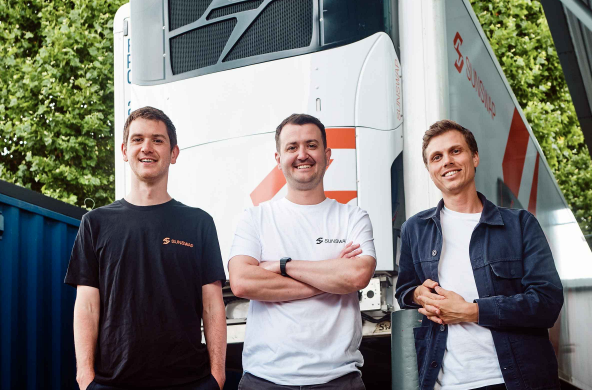Frozen food, zero fumes: the scaleup making cold deliveries cleaner
Sunswap’s solar-powered refrigeration units are taking on the UK and Europe
As the country basks in this heatwave, it feels like a good time to talk to Michael Lowe – an engineer who was working in automotive engineering when he was struck by how “crazy” it was that diesel was still being used to power transport refrigeration.
All those lorries trundling around to retailers carrying chilled or frozen food – and maybe that ice cream you’re craving right now? “Thousands of these units are entering the ULEZ daily without any restrictions, despite producing up to 400 times more particulates than the trucks carrying them,” Lowe points out.
“The technology existed to fix this – someone just needed to engineer it properly.” That’s what his firm, Sunswap, does – building wholly electric refrigeration units, powered by batteries and solar on the roof of the trailer. “Solar power works in perfect harmony with refrigeration,” the entrepreneur adds. “More sun means higher cooling demand, but also more energy generation. It was one of those things where you look at it and thought ‘why wasn’t anyone doing this already?’”
Some 50,000 vehicles across the UK keep their contents cold while burning fossil fuels to run a generator to make electricity to power a compressor. “It struck me as fundamentally ridiculous – like charging your Tesla with a diesel generator,” Lowe adds. Now his firm has electrified the fridges that keep food fresh during transport, and is aiming to eliminate diesel from cold chain logistics.
It’s enjoyed rapid growth: turnover is set to hear £6 million this year. Sunswap’s customers now include frozen food giant Birds Eye, Tesco, and freight firms DFDS, Bannister Transport, and TIP Group. But the business was only conceived in 2020, when its founders – Lowe, Andrew Sucis, and Nikolai Tauber– spent 18 months “in pure engineering mode – designing a purpose-built electric system rather than bolting batteries onto existing diesel technology.”
A first customer trial with DFDS in 2022 ran for 11 days, including two-day frozen delivery cycles on a single charge. “That proved the concept. From there, it was about scaling the engineering into manufacturing – which is all in Britain.” Building in this country meant “world-class engineering talent and a strong manufacturing heritage… quality control, rapid iteration, and supporting British jobs. It wasn’t tough at all – it was obvious,” Lowe adds.
It was a gradual start: a crowdfunding campaign lured 1,100 investors, who put in £850,000. “We launched our first commercial units with DFDS in November 2024 after two years of trials. No fanfare, just units going into daily service. Word spread. When you can demonstrate emissions savings, and cost savings through eliminating expensive diesel fuel, the technology sells itself. The sector is quite tight-knit; success stories travel quickly. We gave [customers] a unit and said, ‘push it to its limits’. The greatest compliment we receive is that it runs just like their current diesel units – operationally, there is no difference. The difference is where it counts: zero emissions, zero diesel, lower noise, and savings on running costs. By the time we publicly launched, operators like Bannister Transport were already committing to fleet-wide adoptions.”
Sunswap – which now employs 100 people – has since raised over £20 million with institutional investors including BGF, Barclays, and Clean Growth Fund. Lowe says he’s not concerned about competition: “it’s good, it will help accelerate the industry’s move away from diesel, which is exactly what we want.”
Now, European expansion is underway. “The market opportunity is massive: there are millions of diesel refrigeration units globally burning fuel unnecessarily causing emissions in urban areas. We’re focused on becoming the European standard for zero-emission refrigeration.”
“In the early days, everyone told us it was impossible – that electric refrigeration couldn’t match diesel performance. Turns out ‘impossible’ just meant no one had engineered it properly yet.”
Read more about Sunswap via their website and read more of our scaleup stories here.

Founders of Sunswap - Michael Lowe, Nikolai Tauber & Andrew Sucis
